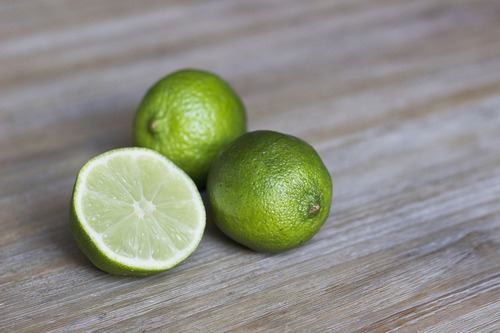Short answer
Lime are not bad for you. In fact, they are actually the complete opposite.
Recommended Alternative
Very healthy and numerous health benefits. A few harmful qualities may be associated, but only under certain circumstances such as an allergic reaction.
View Full Grading System
Category 'A'
Very healthy and numerous health benefits. Side effects are rare. Things rated an 'A+' are typically necessary for survival (for example, water).
Very healthy and numerous health benefits. A few harmful qualities may be associated, but only under certain circumstances such as an allergic reaction.
Very healthy and numerous health benefits. Harmful qualities may be associated, but aren't usually serious.
It is important to note that even the best things in life can become bad in immoderate amounts. So, although something may be rated an 'A+', overconsumption/overdoing can bring unwanted effects.
Category 'B'
Very beneficial to your health. Things rated a 'B+' may have a few harmful qualities to pay attention to.
Overall beneficial to your health. Things rated a 'B' may have some harmful qualities to pay attention to.
More beneficial to your health than not. However, harmful qualities are most likely associated and shouldn't be overlooked.
The main difference between category 'A' and category 'B' is the harmful qualities typically present in 'B' items. Serious side effects are usually uncommon, but are still possible and should be taken note of.
Category 'C'
Both beneficial and harmful qualities associated. Things rated a 'C+' are typically a bit more on the beneficial side. Still, moderation is important.
A fairly even ratio of beneficial and harmful qualities. Moderation is important. Very general topics that can lean towards both sides of the spectrum will be placed here as well. Rice, for example, can be good or bad depending on the type.
More harmful than beneficial. Side effects are common, especially when consumed/done excessively. Moderation is very important.
Category 'C' usually denotes to both good and bad qualities. When it comes to this category, it is important to keep this word in mind: moderation.
Category 'D'
Harmful to your health. Although benefits may be associated, the bad most likely outweighs the good. Moderation is very important.
Harmful to your health. A few benefits may be associated, but the bad outweighs the good. Moderation is extremely important.
Harmful to your health. Very few, if any, benefits are present. Things in this category should be avoided as much as possible.
Category 'D' is typically for things that are more harmful than beneficial. While consuming/doing something unhealthy once in a blue moon shouldn't hurt, we definitely recommend eliminating 'D' items as a regular part of your routine/diet.
Category 'F'
Category 'F' is for things that fail to bring anything beneficial to the table, and are very harmful to your health. We recommend completely avoiding anything in this category. Long-term side effects of 'F' items are usually very serious.
Category 'N'
'N' stands for neutral. Things placed into this category are generally (a) neither good nor bad for you, or (b) lack the necessary evidence to reach any conclusions.
Long answer
Get your pucker face ready! We all know that sour tang of limes (and lemons), that on their own can make them hard to get down. But limes are a crusader for good health, and when used in drinks and cooking, are an easy way to keep yourself feeling fantastic.
Like their other citrus counterparts, limes are a great source of vitamin C. Just 1/4 cup of lime juice has 30% of your recommended daily intake. This helps keep your immune system in fighting form, which in turn helps protect your body against infections and illnesses. The vitamin C also clears free radicals from your body, thereby reducing inflammation and the likelihood that you will get inflammation-based diseases. Because of this, it is an excellent way to keep the pain from arthritis at bay!
On top of arthritis, limes have been shown to lower the incidence and severity of symptoms from sickle cell anemia, including a reduction in debilitating joint pain. The antioxidants present in limes help reduce the build-up of plaque on artery walls, and the acids help clear the excretory system, particularly aiding constipation.
However, the citric acid can also have some detrimental effects. When consumed in large quantities over time, citric acid can erode the enamel on your teeth, leaving them sensitive and in pain. Left untreated, this erosion can affect the nerves in your teeth and you may require a root canal.
However as long as you are enjoying limes in moderation, the good far outweighs the bad.
Possible long-term side effects
Ingredients to be aware of
Benefits
- strengthens immune system
-
prevents and treats scurvy
-
prevents infections
-
aids constipation
-
reduces symptoms of sickle cell anemia and arthritis
-
reduces arterial plaque build-up
-
prevents cholera
Our Wellness Pick
(what is this?)
Organic Lime Juice
- 100% Pure Juice
- USDA Organic Certified
- Non-GMO
- No Added Preservatives
- Convenient 16 oz size
Learn More!
Please turn your Ad Blocker off to see this content. Thank you!
Thank you for your feedback!
Written by Lindsay
Published on: 02-11-2016
Last updated: 12-15-2023
Thank you for your feedback!
Written by Lindsay
Published on: 02-11-2016
Last updated: 12-15-2023

 Approved by
Approved by 















